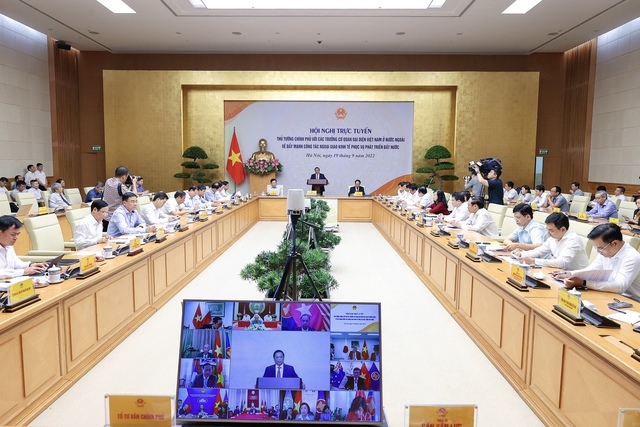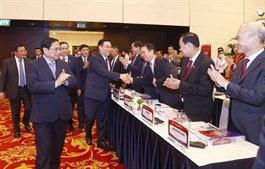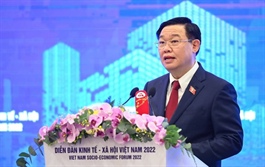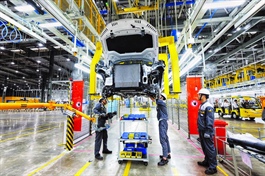Vietnam promotes economic diplomacy to boost growth
Vietnam promotes economic diplomacy to boost growth
Economic diplomacy remains a fundamental part of Vietnam's foreign policy and serves as an engine for rapid and sustainable development.
Vietnam will take drastic measures to promote economic diplomacy to facilitate three growth drivers, including consumption, investment, and exports, to rank higher on the global value chain ladder.

Prime Minister Pham Minh Chinh at the meeting. Source: VGP |
Prime Minister Pham Minh Chinh gave the remarks during a meeting with Chief representatives of Vietnam’s missions abroad on September 19.
Chinh called for diplomatic missions to take utmost advantage of the country’s status and external resources for the country’s development while actively contributing to peace, stability, and development in the region and the world.
"Economic diplomacy remains central to Vietnam's foreign policy and serves as an engine for rapid and sustainable development," Chinh added.
According to Chinh, amid rising global uncertainties, Vietnam should stay focused on identifying challenges and opportunities for the country.
"Vietnam should not sit idly by, but be ready to respond to any situation, maintain solidarity and unity to overcome all challenges and difficulties, and seize any opportunity for growth," he said.
The prime minister stressed the need for Vietnam to keep socio-economic stability in a volatile world, remain steadfast in its development visions, design instruments for risk management under the market-based economy while taking into consideration the ongoing global recession, and promote cooperation and international integration.

Overview of the meeting. |
Chinh hopes that in the future, Vietnam's diplomatic missions will continue to promote Vietnam's image and convey messages about a peace-loving country with diversified and unique culture and hardworking, creative, and friendly Vietnamese lives.
Chinh reaffirmed Vietnam’s vision to continue promoting a socialist-oriented market economy, building a socialist rule-of-law state, and realizing democratic socialism.
In this process, Chinh said the country is working hard to end bureaucracy, pursue multiple ownership and global integration, to take the people as the core, objective, and driving force for development.
“Vietnam would not sacrifice social advancement, equality, welfare, and environment for purely economic growth,” he said.
Meanwhile, it stands firm on protecting territorial sovereignty, political stability, and public order, promoting independent foreign policy and multilateralism, and is committed to being a credible friend and partner of the international community, he continued.
Chinh asked diplomatic missions to continue promoting Vietnam’s tourism by creating favorable conditions for international tourists and ensuring the effective implementation of citizen protection works.
Vietnam will diversify export markets to offset ongoing difficulties in traditional ones, including the US, China, EU, Japan, South Korea, and ASEAN, take advantage of the free trade agreements (FTAs) and prepare for the global FDI shift to move up on the global value chains ladder.
“Vietnam should be active in the search for international partners to attract investment into industrial sectors, especially hi-tech, cultural industry, transport infrastructure, digitalization, climate resilience, and education,” he suggested.
Chinh mentioned the priority for Vietnam to encourage foreign capital to promote green and sustainable growth, support Vietnam in the negotiation process for just energy transition partnership, and finance, technologies, workforce, and legal framework finalization.
“This is particularly significant as Vietnam remains a developing country and was devastated for years by wars in the past, but still make contributions to the global efforts to combat climate changes similar to developed countries,” he said.


















